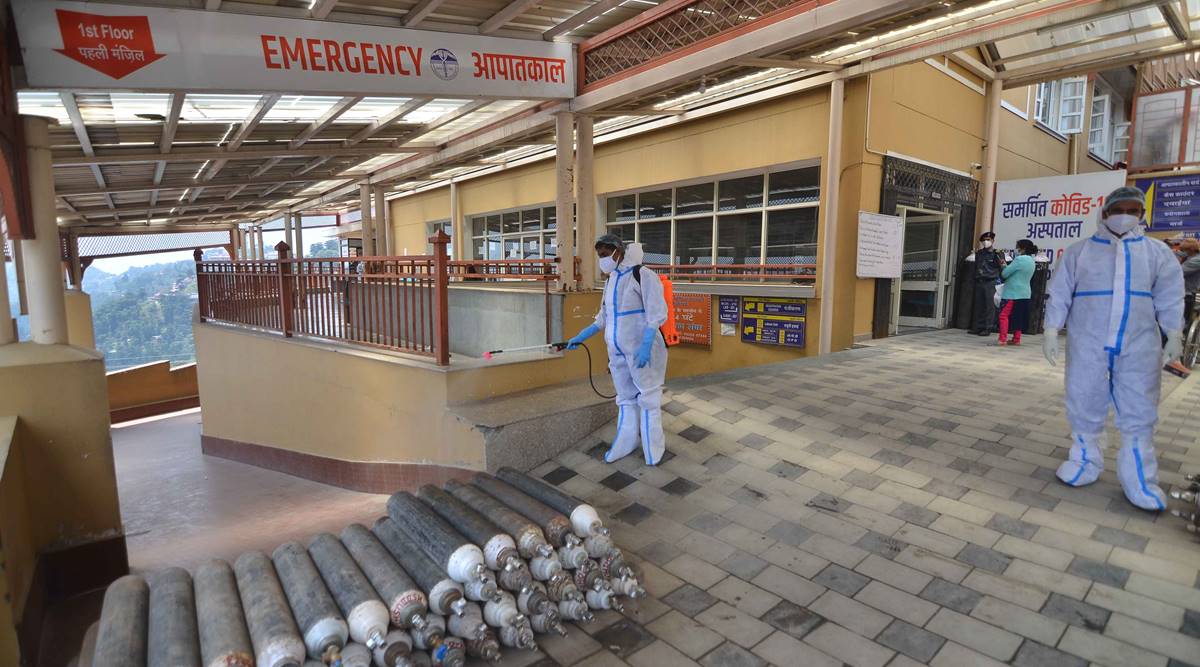 Workers spray disinfectant outside at Covid Hospital Ripon as a precautionary measure against coronavirus in Shimla. (Express Photo by Pradeep Kumar)
Workers spray disinfectant outside at Covid Hospital Ripon as a precautionary measure against coronavirus in Shimla. (Express Photo by Pradeep Kumar) A virus is like a maha maya, a great mystery. It is very difficult to figure out its form and predict its impact accurately. The coronavirus has produced a disastrous and far-reaching impact on human society and democratic politics not only in India but all over the world. It has already reshaped the political discourse in various countries. It is sure to bring about a shift in the political narrative in India as well.
This new narrative is developing around the existential worries and anxieties of people, particularly concerns related to public health, healthcare facilities and infrastructure. The distribution of resources such as medicines, vaccines and availability of hospital beds, treatment facilities, the new essentials such as oxygen masks, are emerging as influential factors in the domain of politics and state power. Call it the politics of medicalisation, this is going to determine the future of electoral democracies and test the popularity of politicians in power and Opposition.
The meaning of development in India is likely to change in the coming days. Instead of bijli, sadak and paani as well as highways, malls and cash transfers, the safety and well-being of the biological body is likely to take centrestage in our developmental discourse. The panic and fear of losing one’s life to a rapidly mutating coronavirus are going to influence the mobilisational strategies of political parties in the coming days. The politics of social justice and people’s rights may have to be reframed around issues concerning the protection of human life. Issues such as distribution of free rations, financial support to the poor as a political gift, etc. may yield ground to healthcare issues for at least a few years.
This shift in narrative is already finding echoes in conversations on social media and other public spaces. Protection from the virus has become the first and foremost desire of society. Caste, class, region and other such determinants have become secondary to the politics of body and life as the pandemic rages. In fact, the coronavirus is likely to turn us into a “biological body-centric society” at least for some time. Proverbs such as jaan bache to lakho paye (get millions if you save your life) in some sense are going to determine our identity. We may retreat from the social space and reframe ourselves as mere biological body-centred individuals, as many writers have pointed out.
This temporary shift in the existential meaning of human life may be at variance with the argument of Bhakti saints, that life is fragile like a drop of water on the leaf, so don’t pay much attention to it. The current fear of death, a fallout of the emergency situation created by the unpredictable virus, compels people to think differently from great saints such as the Buddha, Kabir and Ravidas, who have reflected deeply on human life. This change in the understanding of the meaning of human existence could create conditions that would also force a shift in the political narrative, at least till the memory of Covid lasts. The virus is likely to diminish social identities derived from caste and religion until the health emergency recedes. So, the project of building a political narrative around social identities is likely to weaken in the immediate future. The bitter memory of the death of dear ones due to Covid-19 is likely to linger on in the political narrative even after the threat of the pandemic recedes.
A new diction and vocabulary may emerge and get prominence in the framing political narrative of the country, particularly in northern India. Terms such as health, virus, oxygen, vaccine, mortality rate, medical resources and planning could emerge as keywords in electoral discourse and political campaigns. Seva of virus survivors and commitment to help people in distress may turn out to be important ingredients in the making of popular leaders. This shift may be temporary, but it is sure to shape Indian politics in the coming days.
The writer is professor, Govind Ballabh Pant Social Science Institute, Allahabad
- The Indian Express website has been rated GREEN for its credibility and trustworthiness by Newsguard, a global service that rates news sources for their journalistic standards.

